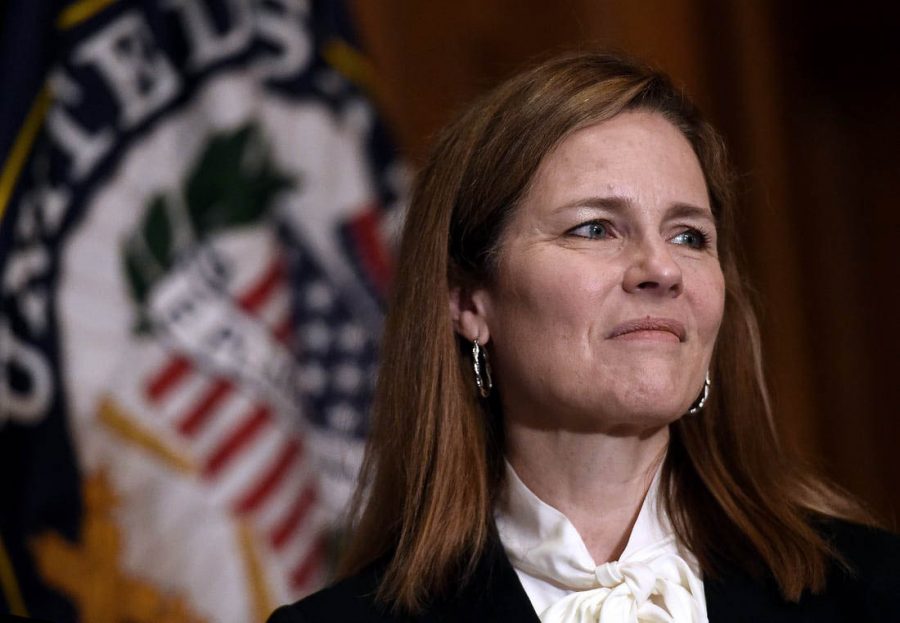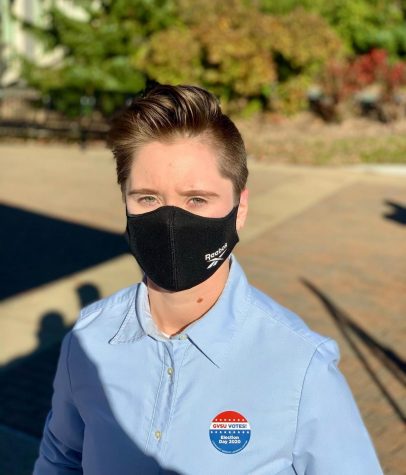Following first presidential debate, Supreme Court nomination hangs in the balance
Oct 5, 2020
On Tuesday, Sept. 29, the people of the United States, and frankly many around the world, witnessed one of the most tumultuous presidential debates in recent decades.
Laden with interruptions, the debate discussed a range of different topics, one of the first being the Trump Administration’s recent Supreme Court nomination following Justice Ruth Bader Ginsburg’s passing, Amy Coney Barrett. On the Supreme Court nomination process, moderator Chris Wallace pointed out the difference of approaches in filling the seat of the two candidates.
When asked why each candidate thought thought their arguments were valid, President Donald Trump said he has a constitutional duty as president to fill the open position, and mentioned that the White House and Senate are currently controlled by a republican majority, a direct “consequence” of the election in 2016. Former Vice President Joe Biden argued that Trump’s administration and Senate Republicans are trying to jam through a nominee before the election.
As for Trump’s nominee, Amy Coney Barrett has made herself known in conservative law circles as a judge on the U.S. Court of Appeals for the Seventh Circuit, since the President nominated her May 8, 2017.
Before then, Barrett served as a professor at Notre Dame, and was a part of Faculty for Life until 2016, which promotes anti-abortion resources, according to her judicial questionnaire. Barrett has twice joined dissenting opinions asking for decisions blocking laws enacted by abortion opponents to be thrown out and reheard by the full appeals court.
A practicing Catholic, Barrett has been open about her views on many issues and has seen criticisms from many government politicians and lawyers on her views.
Despite many inquisitions, Barrett has stated that her faith will not impose itself on her judicial decision-making if she is appointed. Although she would not be the first Catholic to join the court, both justices Sonia Sotomayor and Clarence Thomas are and were practicing Catholics, and are known as ideological opposites.
A vocal critic of the Affordable Care Act (ACA), Barrett has argued that courts should invalidate the law, which provides 8.3 million people with health coverage. She has criticized Chief Justice John Roberts for his decision to uphold Congress’s enacting of large elements of the ACA. Judge Barrett’s potential addition to the Supreme Court could spell doom for healthcare and the ACA.
According to the White House, Senate Republican Majority Leader Mitch McConnell (R-Ky.) expressed his praise for Judge Barrett, calling her a perfect choice.
“President Trump could not have made a better decision,” McConnell said. “Judge Amy Coney Barrett is an exceptionally impressive jurist and an exceedingly well-qualified nominee to the Supreme Court of the United States.”
Barrett’s decisions on sexual assault and discrimination have been debated. In 2019, Judge Barrett wrote a unanimous three-judge panel decision making it easier for men alleged to have committed sexual assaults on campus to challenge the proceedings against them. She criticized a university official involved with the case for siding with a female student victim, citing that the student hadn’t filed a complaint.
LGBTQ+ rights, a long, evolving debate in conservative spheres, are also in question regarding Barrett’s nomination. Some of Barrett’s most notable comments on the issue came during a lecture she gave at Jacksonville University ahead of the 2016 presidential election, while she was a professor at Notre Dame. In the lecture, she defended the dissenters in Obergefell v. Hodges, the landmark Supreme Court ruling which made marriage equality the law of the land, as well as suggesting the Title IX rights afforded to transgender people ought to be reviewed by lawmakers.
Barrett also signed a letter in 2015 addressed to Catholic bishops that detailed her personal beliefs, and that included a statement about “marriage and family founded on the indissoluble commitment of a man and a woman.”
Judge Barrett’s views on conservative issues align easily with her far-right counterparts. Her potential as a seat filler, for Ruth Bader Ginsburg especially, could spell coming disaster for health care, women’s rights, LGBTQ+ rights, minority protections and benefits and gun restrictions.
If appointed as a Supreme Court judge, Barrett’s presence and her vote could radically shift the Supreme Court ideologically to the right right, siding with conservative issues and broadening and bolstering American staples like the Second Amendment. Last year, she dissented alone when a 7th Circuit panel majority rejected a Second Amendment challenge from a man found guilty of felony mail fraud and prohibited from possessing a firearm under federal and Wisconsin law.
The nomination process by Republicans has shown their hypocrisy for American democratic processes, especially considering many representatives have stated previously that there should not be a Supreme Court nomination or appointment during an election year. In September when the President’s nominee was announced and Mitch McConnell announced his intention to move forward with the process, Senate Minority Leader Chuck Schumer (D-N.Y.) said the majority leader and Senate Judiciary Chair Lindsey Graham (R-S.C.) are reversing entirely their previous position on electing a Supreme Court justice during an election year.
“Why not just come to the floor and say I’m going to do whatever is best for my political party, consistency be damned, reason be damned, democracy be damned,” Schumer said. “They know there is no reason, no reason, no argument, no logic to justify flipping your position 180 degrees and calling it some kind of principle. It is not.”
Previously, both McConnell and Graham made statements back in 2016 against the appointment of President Obama’s nomination for Supreme court, Merrick Garland. McConnell eventually blocked Garland’s nomination. Graham, who said he would not confirm a nominee during a presidential year in 2018 during the Kavanaugh confirmation, has now stated that he would in fact vote for a nominee during an election year.
With the election rapidly approaching, this decision ranks high for how some people will cast their votes.
Moving forward, Graham made no changes to the timeline for Barrett’s confirmation hearing, set to take place on Oct. 12. McConnell also reiterated that Barrett should be confirmed out of the committee by Oct. 22 and then head to a floor vote of the full Senate.
Following President Trump and Melania Trump’s announcement that they both tested positive for COVID-19 on Friday, Oct. 2, McConnell said the president’s positive test underscores the need for social distancing or remote hearings at the Judiciary Committee hearing for Barrett later this month. Amy Coney Barrett contracted COVID-19 but stated that she has since recovered fully from the virus. According to the White House, Barrett is tested daily for COVID-19 and tested negative on Oct. 2.
























